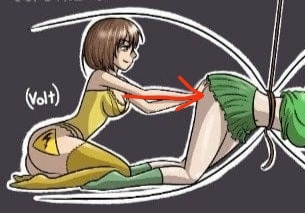What are you doing step-volt?
I don’t know enough about electricity to confirm or deny this interpretation.
It is true though.
It’s been a decade since I studied this, but my instinct says there’s SOMETHING wrong with how amps are portrayed here.
Maybe it’s that restricting current would be more of an inductance thing than a resistance thing? Like Amp should be pushing the walls wider while Ohm tries to hold Volt back?
Amps should be pulling not pushing.
You make physics come alive!
It’s the anime chicks that make it happen 🤷.
I’ll never forget that.
Especially this part.

Out of curiosity, what decade were you born? I understand if you don’t want to divulge. Sorry if it’s an intrusive question.
1985, why?
Thank you. Just curious.
Okay I think I get it.
Amps is the amount current being pushed through a circuit
Volts is how hard the current is being pushed through the current.
Ohms is the amount of resistance inside the current.
More ohms or more Amps necessitates more Volts
Bonus: watts is the rate at which the current is moving through the circuit. Volts squared divided by ohms equals watts. Amps squared times ohms equals watts. Volts times amps equals watts.
Ohms is the amount of resistance inside the current.
Well, it’s not inside the current, more like inside the conductor 😂, but yeah, true… more or less 😂.
More ohms or more Amps necessitates more Volts
You got a funny way of looking at things 😂.
Yes, true, but I never would have thought of saying it like that 😂.
U = I * R
Voltage is the actual regulator of amps. Resistance is (usually) a fixed value (not fixed like Pi or e, but still, it’s considered fixed if the value doesn’t fluctuate too much). So, you need more amps? You raise the voltage. You need less amps? You drop the voltage.
My point is, you can’t raise amps to raise voltage, doesn’t work like that.
Bonus: watts is the rate at which the current is moving through the circuit. Volts squared divided by ohms equals watts. Amps squared times ohms equals watts. Volts times amps equals watts.
That makes total sense, but I’ve never looked at it like that. Thanks for the POV.
What’s funny is that I have always struggled with this subject, but for some reason this illustration made it all make sense.
The original was with a few small people doing the same thing, this waifu version is inspired by that 😂.
deleted by creator
“So watts are the total amount of power being moved?”
“No. Watts are what makes it vore.”
I would have paid more attention in my digital electronics class if the material was more like this
What great imagination!
¿Porque no los dos?
haha the joke is porn






